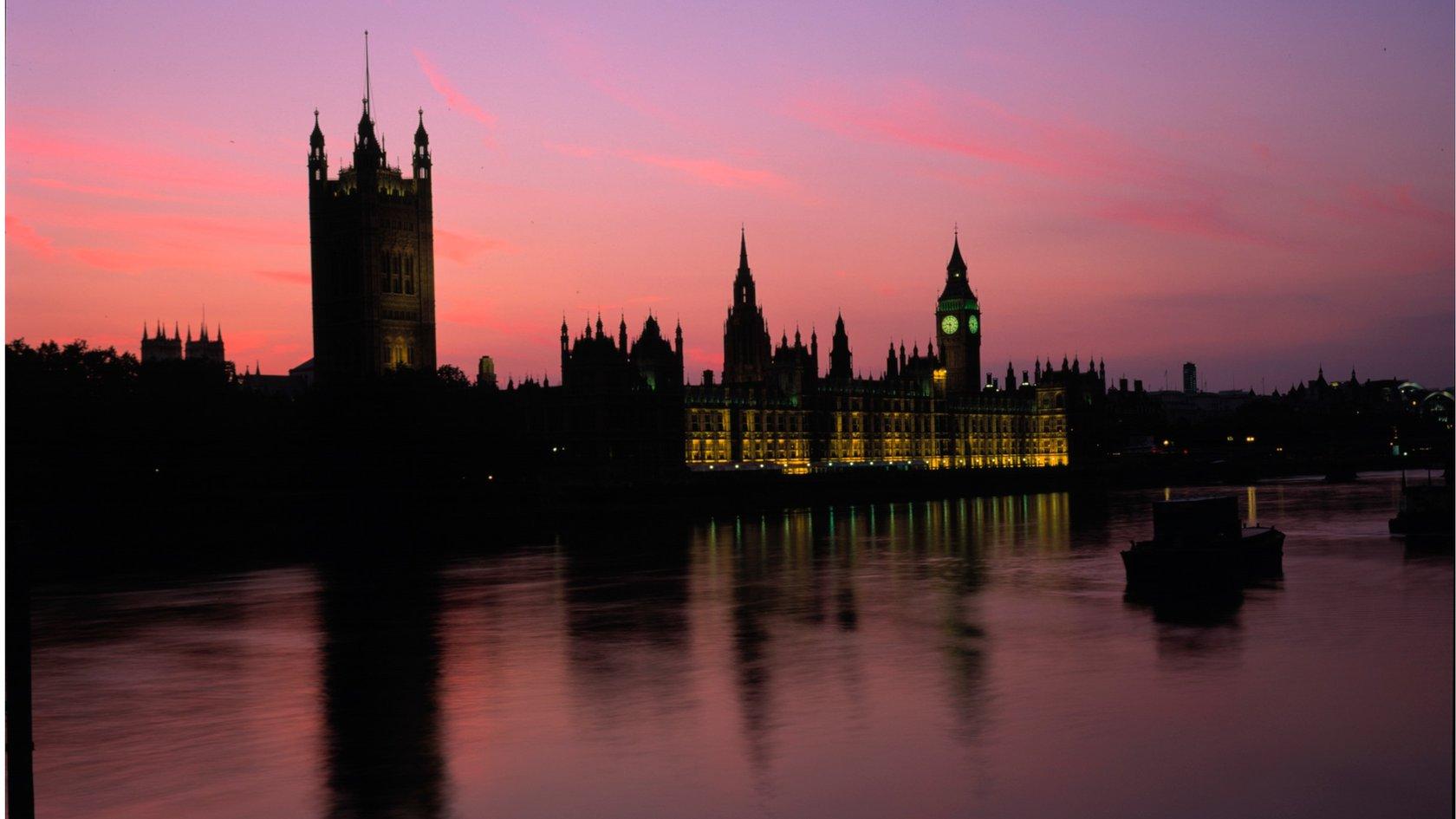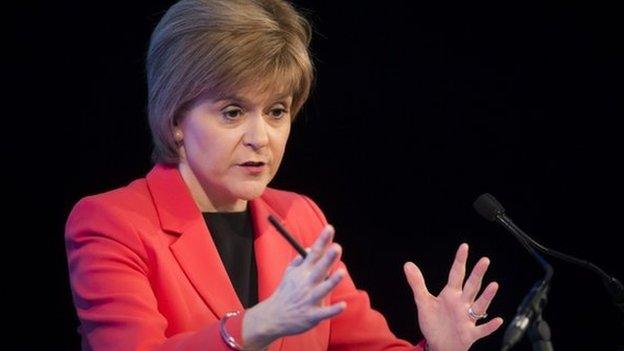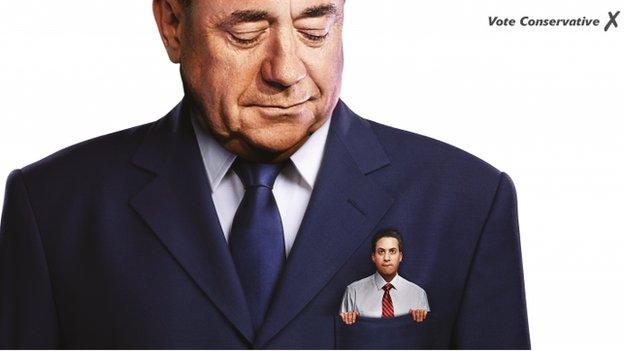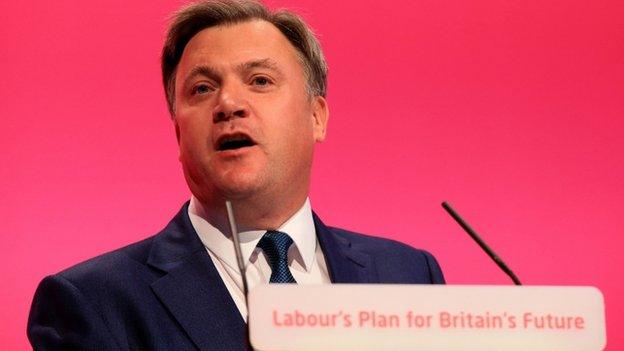Ed Miliband rules out SNP coalition after election
- Published
Ed Miliband: "There will be no SNP ministers in any government I lead"
Ed Miliband has ruled out a Labour-SNP coalition in the event of a hung Parliament after May's election.
The Labour leader said any alliance would "not happen" as there were "big differences" between the two parties
"There will be no SNP ministers in any government I lead," he said, claiming such talk was "scare-mongering" by his Conservative opponents.
David Cameron said it was "despicable" that Mr Miliband had not ruled out a post-election deal with the SNP.
"Not ruling out a deal, or a pact, or support from the Scottish National Party means that the Labour Party is effectively saying, 'We're trying to ride to power on the back of a party that wants to break up our country,'" he told Buzzfeed.
SNP leader Nicola Sturgeon said all the Labour leader had done was "rule out something no-one was proposing".
The BBC's assistant political editor Norman Smith noted that Mr Miliband had not ruled out a more informal arrangement whereby the SNP could offer a Labour minority government support on a vote-by-vote basis, known as "confidence and supply".
'Coat tails'
The SNP's rise in the opinion polls has fuelled suggestions that it may hold the balance of power in May if there is no outright winner, with the party saying it could help support a minority Labour administration.
Ms Sturgeon said earlier on Monday that her party would strive to bring "positive change across the UK" if it played any role in the next government, serving the UK's interests as well as those of Scotland.

Analysis by Scotland political editor Brian Taylor
Politics, especially during an election period, is frequently a blend of blunt speaking and rhetorical gavotte. Politicians hope that it is the blunt message, endlessly repeated, which percolates through and resides in the collective consciousness of the electorate.
But the nuances bear inspection too. Such is certainly the case with the declaration delivered by Ed Miliband that his Labour party will not enter a coalition with the SNP in the event of a hung Parliament at Westminster after May's election.
Why did he not do this earlier? Because Team Labour, especially in Scotland, did not want to give any credence whatsoever to the prospect that the SNP might be potential players in coalition talks.
Their calculation was that addressing the issue of a UK governance deal - even to preclude it - acknowledged the possibility that the SNP might make sufficient gains in Scotland to gain a putative place at the bargaining table in the first place.

Mr Miliband had repeatedly said that talk of any post-election coalition with the SNP was nonsense but had stopped short, until now, of explicitly ruling it out.
Shadow chancellor Ed Balls refused multiple times to rule out any deal on BBC One's Andrew Marr Show on Sunday, saying Labour was working to secure a majority.
The Conservatives have suggested that Labour was trying to get into power "on the coat tails" of the SNP.
At Prime Minister's Questions last week, David Cameron branded Mr Miliband "weak and despicable" for considering a deal with the SNP "who want to break up our country".
'Integrity of UK'
But speaking at a campaign event in Leeds, Mr Miliband said Labour was striving "100%" for a majority so it could "bring about the change Britain needs".
On persistent talk from his opponents of a post-election deal with the SNP, he said: "There are big differences between us on a whole range of issues, not just on the integrity of the UK and another referendum but on fair funding between the countries of the UK and fair taxes.
SNP leader Nicola Sturgeon says Labour and the SNP can still work together to "lock the Tories out of government"
"In repeating this claim, the Conservatives and David Cameron are simply trying to scare people. Labour will not go into coalition with the SNP."
Mr Miliband said the "real danger" was a Conservative government propped up by the UK Independence Party.
Asked whether he would consider an informal post-election deal with the SNP, Mr Miliband said he would not get into "never-ending speculation about how other parties might vote on a Labour Queen's Speech".
'Changes nothing'
Reacting to Mr Miliband's speech, Ms Sturgeon said it did not change much, as the parties could still reach an informal arrangement to "keep the Tories out of power".
"I've said that I thought a formal coalition with Labour was unlikely, but that I could foresee a circumstance in which we would support a minority Labour government on an issue-by-issue basis."
In an interview with Buzzfeed's deputy political editor Jim Waterson on Monday evening, Mr Cameron criticised Mr Miliband for not ruling out such a deal.
"The SNP isn't just any old party, they're a party that thinks that the United Kingdom - our country - shouldn't exist.
"And so I think it is pretty despicable, frankly, not to say, 'look there's no dealing with them we're going to do'. And he [Ed Miliband] is not saying that," he said.
Scottish Labour leader Jim Murphy said the SNP's demands for full fiscal autonomy for Scotland would result in billions of pounds in spending cuts.
"We could never do a deal with any party promising that sort of austerity that would be so devastating for Scotland," he said.
- Published16 March 2015

- Published16 March 2015

- Published9 March 2015

- Published27 January 2015
